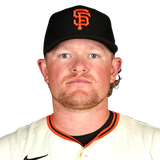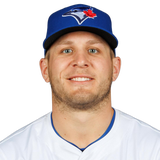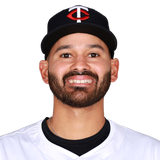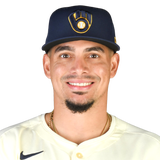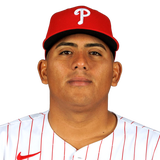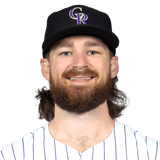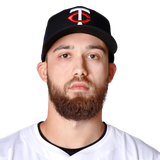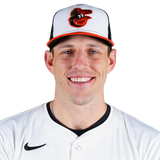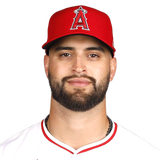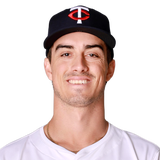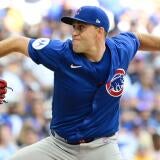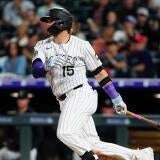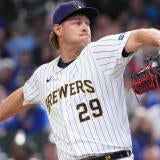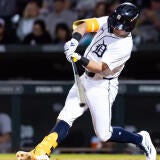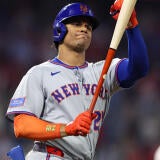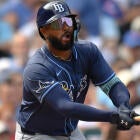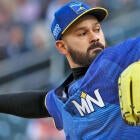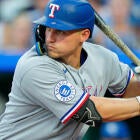| ||||||||||||
2022 Fantasy Baseball Draft Prep: Breakouts 1.0 for Scott White, featuring Daulton Varsho, Willy Adames
For these 12, the best is yet to come.
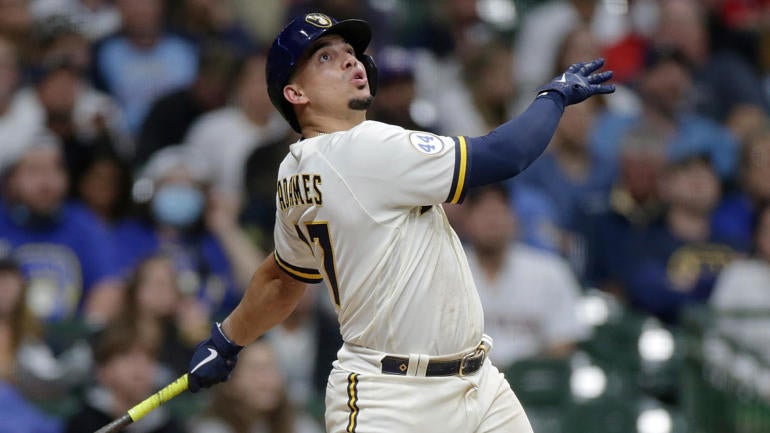
If you thought "sleeper" was hard to define -- and I certainly made it so in my Sleepers 1.0 -- "breakout" is about to break you.
They're sleepers in their own right, right? Value is the goal in both cases, though maybe not to the same extent here. These players have already made a name for themselves in Fantasy, so people aren't "sleeping" on them in the strictest sense. But "breakout" implies that their best is yet to come, in which case their upside may not be fully accounted for.
Simply put, I like them. I love them. You might even say I want some more of them. And in the spirit of charity, I hope to convince you of the same.
Logan Webb, SP, Giants
FantasyPros ADP: 57.3
It may be that Webb is already too far down the breakout path for you to draft him at any sort of discount, but at the very least, it's worth explaining why enthusiasm is so high. After all, he didn't get rolling until August, really, having missed all of June with a strained shoulder and spent all of July building back up. But over his final 14 starts, 12 of which were six innings or more and six of which were seven or more, he had a 2.68 ERA, 1.01 WHIP and 9.6 K/9. He also went 7-0.
It's not like he was some hot-shot prospect, though, a surefire ace in the making. Whatever championships he might have won you last year, isn't more skepticism warranted? Hey, I don't know, but check this out:
Logan Webb, Soul-Stealing 93mph Front Door Sinker. 👻
— Rob Friedman (@PitchingNinja) October 15, 2021
19" arm side run. pic.twitter.com/Qt44W5pWpk
That's the two-seamer, the pitch primarily responsible for him having a 60.9 percent ground-ball rate. The leader among qualifiers, Luis Castillo, was at only 56.6 percent. So Webb isn't getting beat on the long ball, and he isn't getting beat on base on balls, issuing no more than two in any of those 14 starts. Once his changeup joined up with his curveball to give him two swing-and-miss pitches, that was it. Game over.
Every ERA estimator, from the 2.72 FIP to the 2.79 xFIP to the 3.13 SIERA to the 3.20 xERA, says it was legitimate, and seeing as he was consistently providing volume as well, I don't know what more you can ask from a pitcher in the year of our Lord 2022.
Daulton Varsho, C/OF, Diamondbacks
| ||||||||||||
FantasyPros ADP: 111
Between the 37 games he played in 2020 and his first 38 in 2021, Varsho was next to useless in Fantasy, batting .168 (32 for 191). So you may have already tuned out by the time he hit .294 (57 for 194) with 10 homers, three steals and an .886 OPS over his final 57 games.
Even just taking his 2021 numbers at face value -- the .246 batting average and .755 OPS -- he looks like someone who'll factor at the catcher position, offering rare speed and a serviceable amount of power, which is why he's being targeted among the top 10. But the full-season numbers understate how good he became when he finally got the hang of playing in the majors, as well as his overall upside.
Those numbers, the ones from his final 57 games, are more in line with how he performed throughout his minor-league career, batting .302 with an .899 OPS across four seasons, and his modest strikeout rate and all-fields approach would both also suggest he's built for batting average. He's legitimately fast, too, having split his time between catcher and center field last year. That versatility should allow him to play more than most any other catcher, and if he's also running more than any other catcher, he may well have the most upside of anyone at the position. Who knows? By this time next year, we could regard him as the No. 1 catcher.
Blake Snell, SP, Padres
| ||||||||||||
FantasyPros ADP: 111.3
How can a former Cy Young winner "break out," you ask? Well, consider how Snell's career has played out since that 2018 season when he went 21-5 with a 1.89 ERA. Overall, he's 17-16 with a 4.06 ERA and 1.28 WHIP, which is hardly a top-of-the-rotation profile, especially when you consider he's gone six innings or more in just 18 of those 61 starts (29.5 percent). When he entered August last year nursing a 5.44 ERA while averaging just 4.4 innings per start, he was basically done as a Fantasy asset, banished to the waiver wire in all standard-size leagues and not trustworthy as even a matchups play.
But my oh my, did he turn things around. Beginning with his first start in August and continuing through his final eight, he figured out what made him good again. He went almost completely fastball/slider, the latter being his best pitch, and improved his BB/9 from 5.9 to 2.8, his swinging-strike rate from 12 to 15 percent and his ERA from 5.44 to 1.83. He went seven-plus innings in four of those starts, recording double-digit strikeouts in each.
He looked like the Cy Young winner again -- better, in fact, because even that guy struggled to go seven innings -- and the only reason it isn't top of mind now is because an adductor strain shut him down. The turnaround happened under the cover of football season and was brief enough that it couldn't redeem his stat line but also lengthy enough to convince me that a second breakthrough is possible. He once was lost, but now he's found.
Pablo Lopez, SP, Marlins
| ||||||||||||
FantasyPros ADP: 115
At this point, it's just health that's holding Lopez back. He missed most of the second half with a strained rotator cuff but looked like as much of an ace as Sandy Alcantara before then. His ERA was lower than Alcantara's, in fact, and his K/9 higher. And while the average length of his starts didn't compare (because whose could?), it's not like the Marlins were afraid for Lopez to take a third turn through the batting order. Half of his 20 starts went six innings or more.
And the sample of Lopez doing these sorts of things is larger than just those 20 starts. Rope in his 11 from the pandemic-shortened 2020, and he has a 3.26 ERA, 1.14 WHIP and 9.8 K/9 over about a full season's time. Take out a particularly ugly outing from September 2020 -- a 29-run outburst for the opposing Braves -- and he's down to a 2.90 ERA and 1.11 WHIP.
He's a proven strike-thrower with a wipeout changeup and a knack for limiting home runs. His 3.32 xFIP last year would have ranked eighth among qualifiers, between Charlie Morton and Cy Young winner Robbie Ray. All the ingredients are there, then, for Lopez to join the ranks of the elite if he can just navigate a six-month season.
Willy Adames, SS, Brewers
| ||||||||||||
FantasyPros ADP: 143.7
I'm not so sure he hasn't broken out already. He isn't being drafted like it, possibly because the average Fantasy league doesn't offer enough shortstop openings to accommodate all the talent, but then again, he's generally taken a couple rounds after Dansby Swanson, whose ceiling at this point is decidedly mid-tier.
Make no mistake, though: Adames was a stud after joining the Brewers, batting .285 with 20 homers and an .886 OPS in the three-quarters of a season he spent with them. The turnaround was just as evident in his strikeout rate, which shrank from an unmanageable 35.9 percent with the Rays to 25.4. Much has been made of Adames' issue with the batter's eye at Tropicana Field, but you may be surprised to learn how well the numbers back the narrative. In all his time with the Rays, which began in 2018, he hit .219 with a .624 OPS at home. He hit .291 with an .858 OPS everywhere else.
Now, where I have seen those numbers before? Oh right, they're almost exactly what he did with the Brewers. Could it be, then, that that's just who he is? We have 1,045 non-Tropicana at-bats to suggest so, in which case Adames may have more in common with Xander Bogaerts than the aforementioned Swanson.
Ranger Suarez, SP/RP, Phillies
| ||||||||||||
FantasyPros ADP: 145.7
I know what you're thinking. "Scott, you delightful simpleton, how could Suarez possibly improve upon a 1.36 ERA?" And to that, I'd say, "I'm the simpleton? You're the simpleton!" and remind you that breakouts are as much about perception as anything else. Nobody is drafting Suarez like he had a 1.36 ERA, a 2.36 ERA or even a 3.36 ERA, which means that if I think he's capable of a 3.36 ERA, I'm entitled to call him a breakout.
I think he's capable of a 3.36 ERA. The evidence? He just put together a 1.36 ERA. I know it's circular reasoning, but it doesn't take a galaxy brain to see the appeal here. Sure, he spent the first two-thirds of the season in relief, which skews the numbers a bit, but even after joining the rotation in August, he had a 1.51 ERA in 12 starts. His final five were all six innings or more, and his strikeout and walk numbers actually improved with the increased workload.
He was built for this, generating quick outs with a ground-ball rate just as superlative (59.2 percent) as Logan Webb's, and his 2.62 xERA and 2.72 FIP both agree it's a formula for keeping runs off the board. So far, Suarez has been the kind of player people take begrudgingly rather than enthusiastically, but particularly in points leagues, where you can take advantage of his relief pitcher eligibility, he's a high priority for me.
Brendan Rodgers, SS, Rockies
| ||||||||||||
FantasyPros ADP: 160.7
Anyone getting regular at-bats for the Rockies has sleeper appeal, and it goes double for a former high-end prospect just coming into his own. So why isn't there more enthusiasm for Rodgers? Fatigue, I guess. He was drafted third overall in 2015 (going a pick after Alex Bregman, just to give you a sense of how long ago it was) and earned high marks all the way up the minor-league ladder. But it took forever, and then when he finally got the call, there were struggles, amplified by injuries.
An injury (hamstring) delayed the start of his 2021 as well, but when he returned in late May, there were no more struggles. His strikeout rate was a respectable 20.2 percent, meaning he puts the ball in play enough to take advantage of Coors Field's spacious outfield, and yet he produced an even better slash line on the road (.289/.337/.536), which is always a good sign for a Rockies hitter. A respectable batting average is a given as a long as he continues to put the bat on the ball, and it might only take him elevating a little more for Rockies fans to forget all about Trevor Story.
Alex Kirilloff, 1B/OF, Twins
| ||||||||||||
FantasyPros ADP: 186
Oh, here we go. One of my obsessions last spring is poised to make me look like a chump again, right? Well, think back to how last season played out for the rookie. He got off to a 3-for-26 start, which wasn't unprecedented but was particularly frustrating because of what the Statcast data said he should be doing (i.e., obliterating the ball). He then caught up to the data, hitting four home runs and two doubles over his next four games, before tearing a ligament in his wrist and spending the next few weeks on the IL. He tried playing through the injury for a couple months, with mixed results, before ultimately relenting to season-ending surgery.
Clearly, we didn't get him at his best, and this tweet spells it out better than I could:
Alex Kirilloff wasn't the same after the wrist injury.
— Aaron Gleeman (@AaronGleeman) July 21, 2021
Expected AVG:
.317 before
.281 after
Average exit velocity:
96.5 mph before
89.7 mph after
Hard-hit rate:
63% before
40% after
As feared, he just wasn't able to drive the ball as much while playing with a torn ligament.
A healthy Kirilloff hit .348 with a .970 OPS between two minor-league stops in 2018. A wrist-deficient one (yes, last year wasn't the first instance) hit .283 with a .756 OPS at Double-A the following year. Now that the ailment has been addressed once and for all, I expect to see more of the former from a player with a sweet swing, a line-drive mindset and a penchant for hard contact.
John Means, SP, Orioles
| ||||||||||||
FantasyPros ADP: 199
One of my most hyped preseason picks from a year ago sort of delivered on that promise, making waves early on at least with a no-hit,12-strikeout effort against the Mariners. But he missed a quarter of the season with a shoulder strain and ultimately failed to sustain the strikeout gains from late in 2020, which are what got me so excited in the first place. Factor in his extreme fly-ball rate, which would have been the second-highest among qualifiers, and I ultimately decided he didn't have it in him to counteract all the damage likely coming his way in the AL East and his home park in particular. I was prepared to fade him.
But then came the news of the Orioles moving back the left field fences at Camden Yards -- and not just a little, but a whopping 30 feet. How does that change things? See for yourself:
These are all 30 ballparks, with the changes made to Camden in yellow. pic.twitter.com/eGpMNm9Q4p
— Andrew Perpetua (@AndrewPerpetua) January 14, 2022
Did I mention they're also raising the height of the fence from seven feet to 12? Yeah ... I don't think it's an exaggeration to say it may now be the toughest place for a right-hander to hit it out, which is bad news for Ryan Mountcastle but good news for the left-handed Means, whose fly-ball tendencies will now be an asset rather than a hindrance. It shouldn't be lost on anyone that his no-hitter last year came at Seattle, with its cavernous outfield. It also shouldn't be lost on anyone that he had a 4.62 ERA at home last year compared to 2.84 on the road. It's like they're making the changes just for him!
Patrick Sandoval, SP, Angels
| ||||||||||||
FantasyPros ADP: 211.3
So it turns out Sandoval's changeup is one of the best swing-and-miss pitches in all the majors, a mid-80s offering that looks just like his fastball out of the hand. In fact, it may have surpassed Luis Castillo's for best in all of baseball. We've known about it for a while, but it wasn't clear if he'd throw enough strikes or enough innings for it to matter.
Well, he began to do both last year and, um ... yeah, it mattered. His 15.2 percent swinging-strike rate was bettered by only five pitchers, at least among qualifiers. He even got 30 swings and misses in one game, which is something Max Scherzer can't say, nor Corbin Burnes, nor Jacob deGrom. All those whiffs weren't just empty calories either. From the time Sandoval joined the rotation in mid-May up until his final start (when it became clear he wasn't healthy), he had a 3.12 ERA and 1.06 WHIP. That's 13 starts in all.
The only thing keeping the hype train on the tracks is the lumbar issue that ended his season in August, but there shouldn't be any carryover effect. If he can stay intact and keep his walks under control, Sandoval has legitimate frontline potential.
Joe Ryan, SP, Twins
| ||||||||||||
FantasyPros ADP: 215.7
The case for Ryan isn't complicated. Between 2019 and 2021, across 189 2/3 innings and four minor-league levels, he compiled a 2.47 ERA, 0.82 WHIP and 13.0 K/9, incredible numbers by any standard. So why isn't he mentioned in the same breath as Shane Baz? Because nobody believes it. His success is tied to his fastball, a pitch he throws 65 percent of the time, but it doesn't spin. It doesn't sink. It barely tops 90 mph. What's the deal with that?
The concern is that it's a gimmick and that once hitters get a read on the angle, he'll be reduced to a soft-tossing control specialist. The profile is a little reminiscent of Mike Fiers, who also torched the minors leagues before running into reality in the majors. He had a reasonably successful career regardless, but initial returns were more of a fakeout than a breakout.
Maybe this goes the same way, but what if it doesn't? At this cost? In Ryan's first taste of the majors, things played out much like they did in the minors. Seven one-hit innings here, an 11-strikeout effort there. His fifth and final start was his worst, bringing the ERA over 4.00, but with a 0.79 WHIP and 10.1 K/9, my initial takeaway is that it should work, at least for now. And as efficient as he is, the volume could be there in a way it won't for someone like Baz.
Tony Gonsolin, SP, Dodgers
| ||||||||||||
FantasyPros ADP: 273.3
I liked Gonsolin as a breakout last year, too, but things didn't play out the way I hoped, clearly. So what's different about this year? Opportunity, mainly. Max Scherzer is gone. Clayton Kershaw and Trevor Bauer are presumed to be as well. With Walker Buehler and Julio Urias their only remaining fixtures, the Dodgers need Gonsolin in their rotation unlike they ever have before, which should spare him the role roulette that's defined his career so far.
Granted, 27 of his 35 career appearances have come as a starter, but rarely has he been stretched out to handle a conventional workload. I'd argue he never got that chance last year because, in addition to the usual shenanigans, his shoulder wasn't right, landing him on the IL twice. It explains the rise in BB/9 from 1.4 in 2020 to 5.5, but the impact goes beyond that. Only when he returned for good in September was his velocity up to snuff, his slider and splitter back to piling up whiffs. In fact, his 15.1 percent swinging-strike rate in that final month was better than Gerrit Cole had for the entire season.
So far as a major-leaguer, Gonsolin has a 2.85 ERA, 1.09 WHIP and 9.4 K/9. That's over just 142 1/3 innings, but across three seasons. If he can repeat it all in this one, it would be good enough for me.


